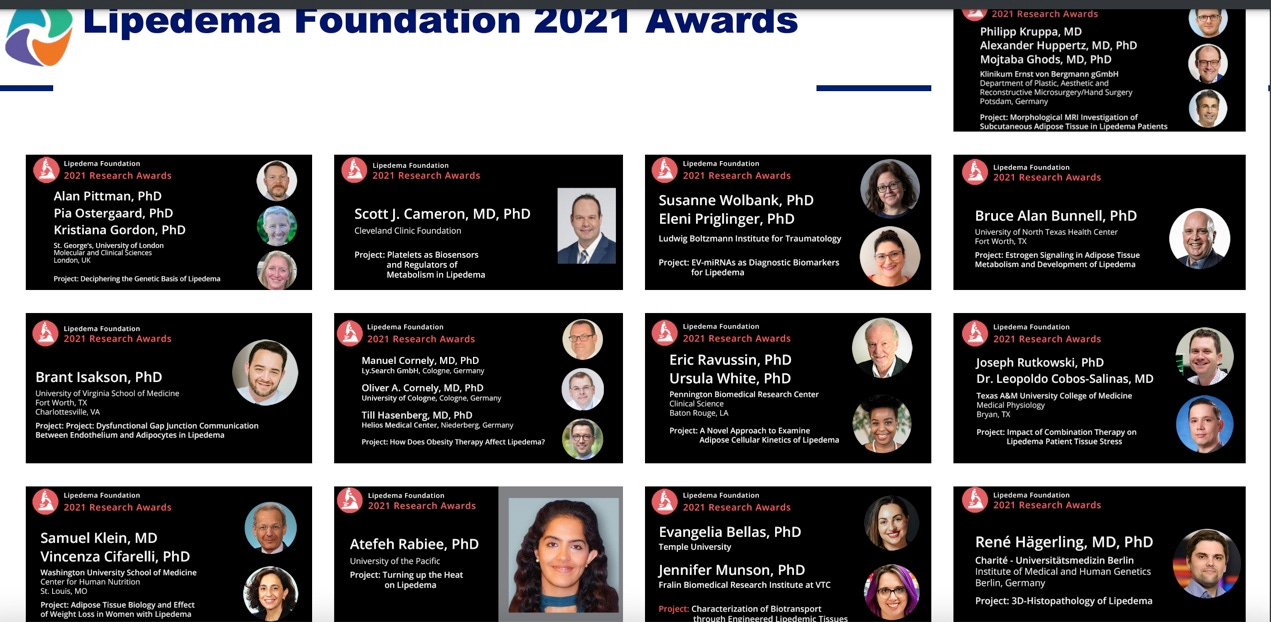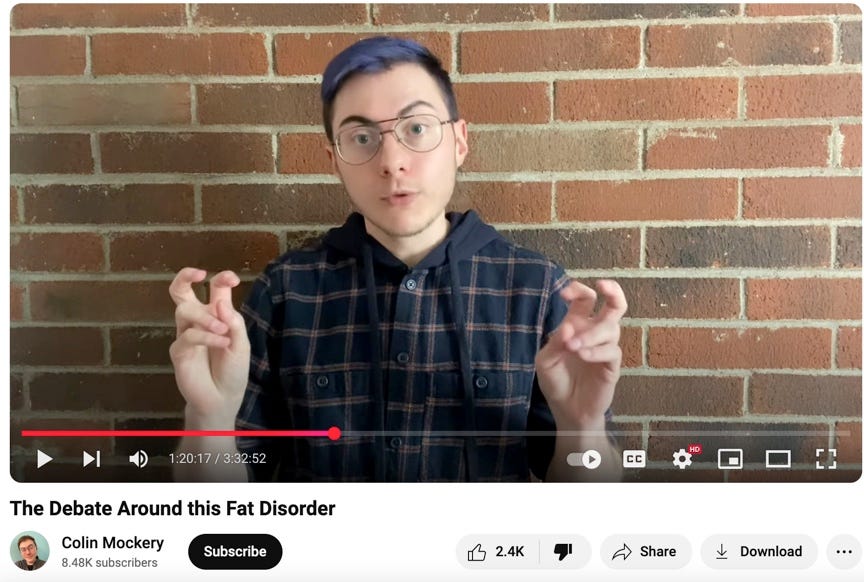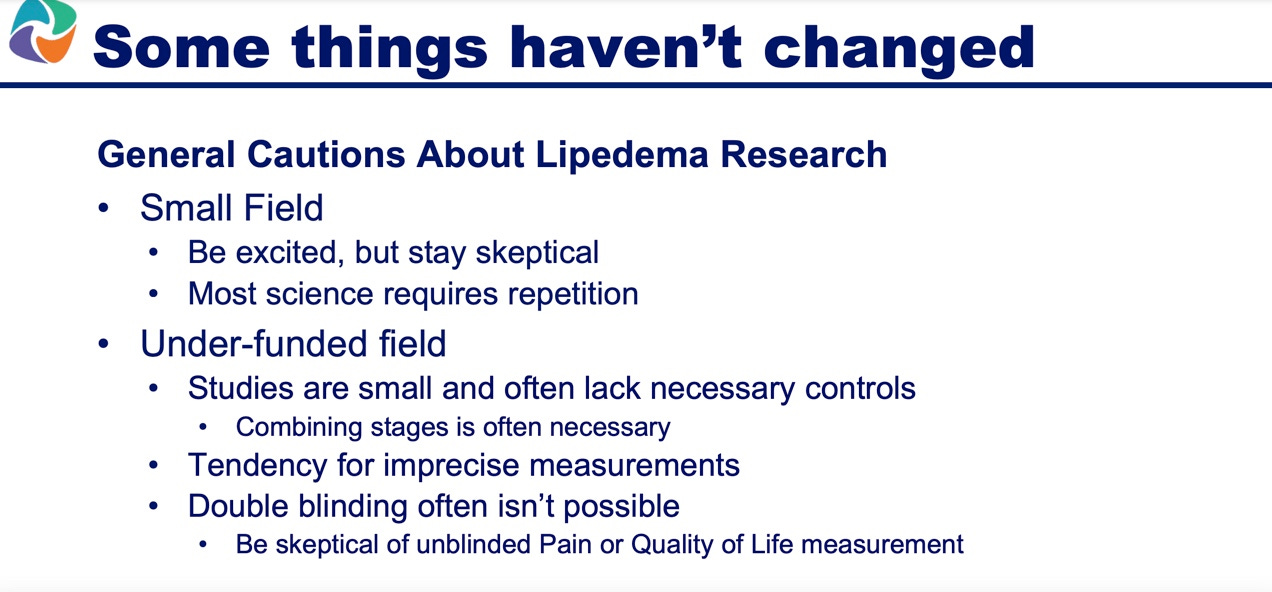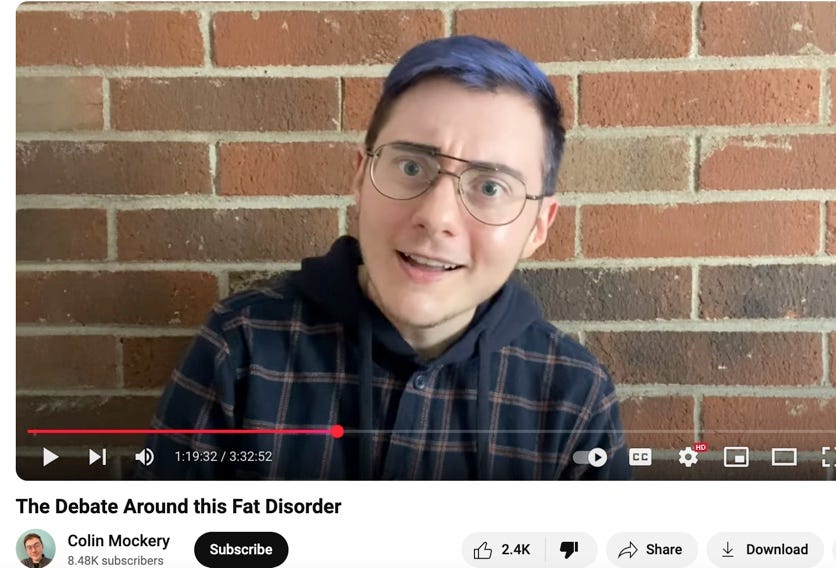Recently, I wrote about a video by “Colin Mockery” in which he goes out of his way to discredit lipedema and undermine those who advocate for and research our chronic illness. In my last post, I only covered the first hour of his 3.5-hour tirade.
In that first hour, he dismissed the way lipedema is diagnosed, then proceeded to claim that women with lipedema are simply obese, that our pain isn’t real, and that any form of care—whether alternative or prescribed by medical doctors and surgeons—is "pointless."
With this post, I’m going to get into the rest of the video, and WOW! There’s so much to unpack.
Colin claims to present his “research” on lipedema but instead personally targets well-known experts and advocates in our small (yet steadily growing) lipedema community.
His video starts seemingly neutral as he parrots lipedema information he’s pieced together from internet searches. However, it quickly becomes evident that he holds disdain for anyone in the U.S. who advocates for or researches lipedema, and this sentiment comes through loud and clear.
Colin’s so-called “research” on lipedema is nothing more than misinformed opinions disguised as expertise, targeting respected advocates and experts while painfully exposing his lack of medical knowledge and how research works.
Colin engages in a lot of verbal gymnastics, often prefacing his comments with statements like, “Now, I’m not a medical person, but…” before diving into biased views about medical techniques, treatments, and research related to this newly recognized condition.
Colin, if you’re reading this, you’re absolutely correct about one thing— you are NOT a medical person. It’s painfully obvious.
At this point, I feel compelled to debunk his supposed debunking. And although it takes a ton of data to counter one dismissive comment, I’ll do my best to make arguments about some of his false claims.
Two very annoying habits of Colin made it difficult to watch his video…
Colin frequently snickers or chuckles before critiquing the individuals he discusses. Perhaps he believes he’s clever and has uncovered a deeper truth, but this approach only highlights his underlying bias. His tone often comes across as condescending and overly snarky, undermining his credibility and making it difficult to take his arguments seriously.
He frequently resorts to double-talk, adeptly sidestepping any accountability for the claims he is about to make, often prefacing them with phrases like:
“I can’t prove…”
“I don’t know…”
“I’m not a medical expert, but…”
He then follows this with an outrageous assertion, entirely rooted in his unqualified perspective.
There are several parts of his video I want to address briefly, particularly the hypocrisy in how he targets certain individuals. These include people who have stepped into the spotlight to raise awareness about lipedema, beyond just Dr. Herbst.
People such as Linda-Anne Kahn, Brenda Viola, and Felicitie Daftuar. According to Colin, they are either “in it to make money” or unqualified to be advocates.
I must emphasize the biting sarcasm with which he lists Linda-Anne Kahn’s credentials as if her massage and aromatherapy aren’t legitimate disciplines. Frankly, he is in no position to speak. Here is a man with no medical education at all, offering lengthy opinions on intricate and highly complex medical matters. That, in itself, is the very definition of hypocrisy.
Colin clearly doesn't understand how research works.
Colin references a 2015 study by Dr. Herbst (she was not the only author of the study) which is most likely this archived paper Lipedema Fat and Signs and Symptoms of Illness, Increase with Advancing Age.
In this study, he dismisses the paper as not being "real research" simply because it lacks a control group.
The absence of a control group does not automatically invalidate the research.
While the absence of a control group limits the conclusions that can be drawn from a study, research without a control group can still be legitimate, especially in exploratory or early-stage studies—which is exactly what this study is. And we are talking about a study published ten years ago that used chart review data from 2012 and 2013.
Colin references archived medical studies but makes no effort to explore more recent research. I’ll delve into this a little further below.
Colin asserts that hypermobile EDS is not connected to lipedema
There is a cluster of comorbidities that are more prevalent in women with lipedema, such as hEDS, MCAS, POTS, ADHD, and others. For Colin’s sake, let’s get clear about what a comorbidity is:
Comorbidity refers to the simultaneous presence of two or more medical or psychological conditions in a single individual.
These conditions may have shared underlying mechanisms, genetic predispositions, or environmental triggers, which make them more likely to occur together.
Colin hyper-fixates on hEDS and how that relates to lipedema. It seems that he focuses on this because it’s an easy target for him: Dr. Herbst says lipedema women have a higher incidence of hEDS, so it must not be true; and that Dr. Herbst is biased because she also has hEDS. Never mind that Dr. Herbst was diagnosed with hEDS after this study was completed.
In the 2015 study, they used the Beighton scoring for hypermobility, which is a perfectly valid tool, and then the authors suggested this could be hEDS. That’s all.
~50% of women with lipedema had a positive Beighton score ( ≥ 5) suggesting that they may also have the common disorder known as Ehlers Danlos syndrome hypermobility type ~Source
Due to the data mining of chart reviews, the research team could not clinically assess patients further for hEDS. That’s okay, too; it is merely an observation.
However, Colin also dismisses the Breighton scoring system as a useful tool. Yet, the Ehlers-Danlos Society uses this scoring as criterion on their formal diagnostic criteria checklist.
A cute little side note: The Ehlers-Danlos Society uses the zebra as its symbol because of the saying taught in medical training: "When you hear hoofbeats, think horses, not zebras." This phrase encourages doctors to consider common diagnoses before rare ones. However, individuals with Ehlers-Danlos syndrome (EDS) and other rare conditions are the "zebras" in the medical world—rare and often overlooked or misdiagnosed.
This is the same with lipedema—we are also zebras.

Colin only references research, articles, and other information from 8-10 years ago.
In his debunking, he consistently references two research articles; the one previously mentioned from 2015 and one from 2017, both with Dr. Herbst’s name on them. However, there has been increased research since then.
Because of the efforts of a few women (Dr. Herbst, Linda-Anne Kahn, etc.) who have been advocates and spreading lipedema awareness, many other MDs and PhDs have also started researching our condition, from diagnostic biomarkers to biology to treatment effectiveness.
As I said in my last post, research takes years, even DECADES, to explore and translate results into practical applications fully. Colin targeting the infant stages of research from 8-10 years ago and not looking at the progression of lipedema research since then is negligent.
As much as Colin criticizes lipedema research, it is being done by legitimate medical researchers and funded by credible foundations, including the National Institute of Health (NIH).
The other part he doesn’t discuss is that credible lipedema entities are quite aware of the holes and imperfections of lipedema research.
We are at the baby stage of lipedema research. It is REAL science, not the “pseudoscience” that Colin claims it to be.
Colin Gives Misinformation on The Standard of Care (SOC) vs the International Lipedema Association (ILA)
In Colin’s video, he pits the SOC against the ILA and claims that the two entities are at odds with the concept of lipedema.
However, he is comparing two entities with different objectives, which is like comparing apples to oranges.
It’s clear that Colin cannot distinguish between the two, nor does he understand the purpose of a Standard of Care overall.
Let me explain:
The Standard of Care in the United States has a narrower focus, relying heavily on scientific and clinical evidence.
SOC guidelines are critical and widely accepted in the medical field. They play a significant role in shaping Medicare policies.
Let me say that again: They play a significant role in shaping Medicare policies.
They also provide a comprehensive framework to standardize the diagnosis, treatment, and management of specific diseases, all while addressing the unique challenges of the U.S. healthcare system.
If you don’t already know, the U.S. healthcare system is unique because it’s a for-profit system where health insurance companies often deny care. Without a Standard of Care, there’s no guideline for care, which creates a huge mess when it comes to diagnosis, treatment, and insurance reimbursement.
U.S. Standard of Care helps in many ways:
Improves Patient Outcomes: It reduces variations in care that could lead to poorer outcomes or complications.
Provides Legal and Ethical Guidance: it’s a benchmark in medical malpractice cases to determine whether a healthcare provider acted within the acceptable norms of medical practice.
Promotes Evidence-Based Medicine: ensures that medical practices are grounded in science and updated as new evidence emerges.
Supports Insurance and Reimbursement Policies: In the U.S., insurance companies often rely on the SOC to determine coverage for treatments and procedures. It helps define what treatments are medically necessary and eligible for reimbursement.
Addresses Emerging and Rare Conditions: For conditions like lipedema, where knowledge is evolving, an SOC ensures that patients receive care informed by the most current understanding.
Since my expertise is insurance reimbursement, I can testify that the lipedema SOC is a huge step for us in getting insurance coverage for our medical treatment. Overall, the Standard of Care is a good thing for us, it helps legitimize and give weight to our illness. That is what it’s designed to do.
The International Lipedema Association
The ILA focuses more on the patient perspective, strongly advocating for patient empowerment by educating individuals about a wide array of treatment options. It prioritizes helping patients make informed decisions based on their unique needs, preferences, and lifestyle.
Our VISION is to improve the quality of life among people affected by lipoedema globally, by providing holistic, evidence-based treatment according to their individual needs.
Our MISSION:
We are dedicated to creating the best possible treatment for our lipoedema patients by collaborating in an international, diverse, inclusive, and multidisciplinary team approach which is based on clinical evidence, long-standing experience, and a passion for improved therapy outcomes. Source: ILA website
Differences in Purpose, Audience, and Approach
The International Lipedema Association (ILA):
Purpose: To provide a patient-centered, holistic framework for managing lipedema. The ILA emphasizes choice, inclusivity, and innovation in care.
Audience: Primarily patients, advocates, and alternative care providers, though it also collaborates with healthcare professionals.
Approach: Broader and more exploratory, focusing on education, advocacy, and diverse care strategies, including alternative and complementary therapies.
The Lipedema Standard of Care (SOC):
Purpose: To establish a narrow, evidence-based framework for healthcare providers to diagnose, treat, and manage lipedema consistently and effectively.
Audience: Medical professionals, including physicians, surgeons, and insurance companies.
Approach: Focused on clinically proven interventions, with strict adherence to scientific evidence and measurable outcomes.
Where Colin sees contention, I see collaboration. I believe we need both of these entities, to focus on different aspects of lipedema treatment.
I wanted to get to the bottom of what Colin was trying to say about lipedema.
What is his endgame?
As I (finally) got closer to the end of the video, I figured it out with a reference he made. Colin suggests we all watch the Netflix show “Afflicted,” a documentary series that explores chronic and mysterious illnesses. This show echoes Colin’s belief, which casts doubt on the legitimacy of the chronic conditions they explore. And the show has had a severe backlash from the chronic illness community.
Colin doesn’t like “alt-med people” or alternative medicine (this is an interesting take since the ILA significantly focuses on alternative care). He mentions this several times throughout his video. However, for lipedema, we thrive best when we are using alternative medicine modalities along with our conservative care. There is nothing wrong with that.
For example, if you have heart disease or diabetes, a physician will certainly prescribe medication (something women with lipedema aren’t fortunate enough to have available). You will also be advised to eat a healthy diet, exercise, manage your weight, take beneficial supplements, quit smoking, and reduce stress through various methods such as meditation, massage, aromatherapy, yoga, acupuncture, and other practices that aren’t considered “conventional medicine.”
Alternative medicine and conventional medicine aren’t an either/or consideration. You can use both at the same time. In fact, I highly encourage it.
And throughout the entire 3.5 hours, Colin casts doubt on the legitimacy of our condition. He states that we are misguided and don’t know what we are suffering with. He believes that our condition is due to obesity. We should focus on that, not on all these other silly things.
Ultimately, he believes we are all being lied to by other people who only want to make money.
I’ll tell you, I make very little money from my lipedema advocacy. I live with lipedema, and I am not obese. I have greatly benefitted from conservative care, alternative medicine, and liposuction surgery. Sorry, Colin, but it’s not about the money for many of us.
Regardless, he does NOT provide any solutions to what he’s proposed. He only says that he feels terrible and that he’s sorry the video turned out to be so sad. He ends it by referring to the United States advocates and researchers as charlatans, pseudoscience, and a huge pervasive problem that HE doesn’t know how to break through.
Colin. Let me hold your hand when I say this: You don’t need to break through anything. Leave the lipedema community alone; we’ll do just fine without you.
Take care,
Michelle















Unbelievable. Makes you wonder why someone like this would even say these things without any good knowledge of what he is talking about. Thank you for exposure.